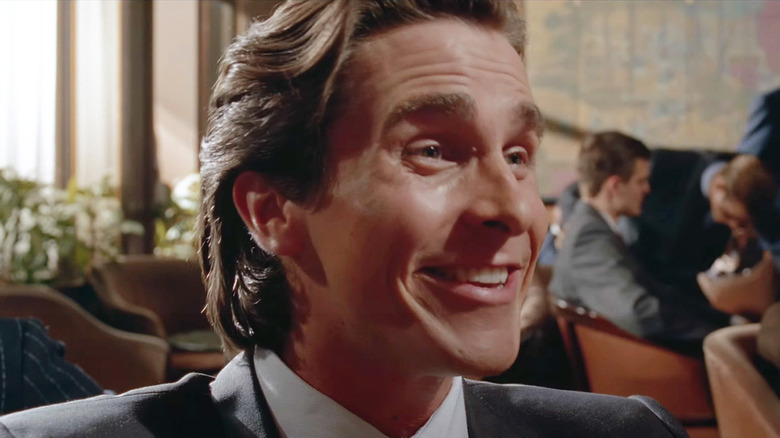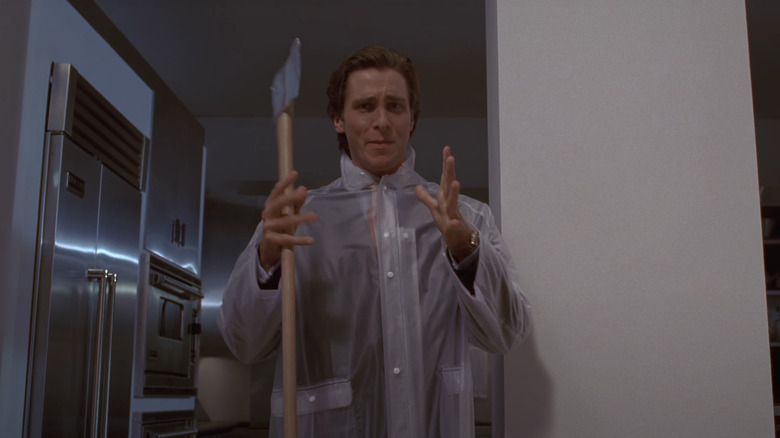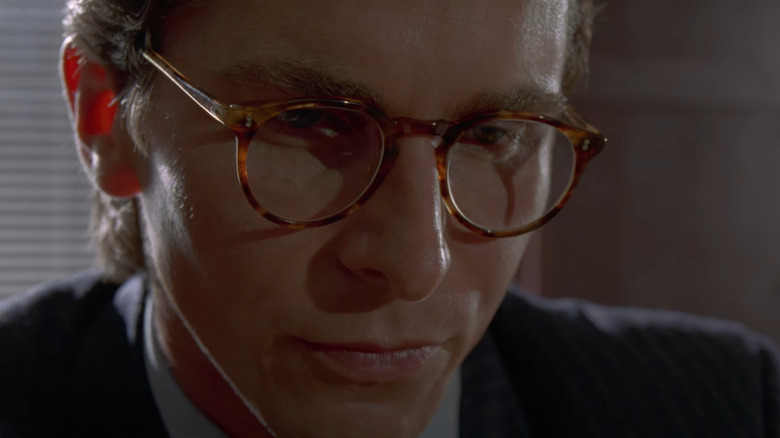Mary Harron Didn't Know If American Psycho Would Work When She Started Writing The Script
A lot of people were very upset when Brett Easton Ellis' novel "American Psycho" hit shelves in 1990. The book's hyper-violent scenes overshadowed much of its social satire, as concerned parties spoke out about the damaging effect the book was apparently bound to have on society. Tammy Bruce, then-President of the LA chapter of the National Organization for Women, went as far as calling it a "how-to novel on the torture and dismemberment of women."
Unfortunately for all its detractors, Ellis' novel has endured as a devastating indictment of 1980s yuppie culture and consumerist, wealth-worshiping society in general. Anyone who wasn't determined to be offended by the book was easily able to see the razor sharp critique of Reagan-era consumerism at its core and the humor that drove much of that critique. "American Psycho" is funny — darkly funny, but funny nonetheless.
One fan of the novel who did notice its humor was Canadian writer/director Mary Harron. When it came time to adapt the book for the big screen, Harron was determined to highlight what she saw as its overlooked elements with her take on the material. It would take multiple scripts, including a rejected version penned by Ellis himself, before Harron was given the go-ahead to direct her own iteration of the screenplay. But even then, the director wasn't sure the adaptation would work.
Bateman the buffoon
The controversy surrounding "American Psycho" didn't end with the novel. The film version arrived in 2000 and Christian Bale faced real-life threats for signing on to play Patrick Bateman, the vacuous, narcissistic, and highly violent investment banker at the center of the story. But while violence would play a big role in the film adaptation, both Bale and Harron were eager to emphasize the book's humor in their on-screen version. As the director put it in an interview:
"I felt that the book had been misunderstood. When I started reading it I thought 'Oh, this is actually really funny.' Obviously there's extreme violence in it — but there's also a satirical side that no one was talking about. I felt like the best parts had been overlooked. I had no idea whether it would work as a movie but I told the producer, 'If you pay me to write a script, I'll have a go.'"
The producer did indeed let have Harron have a go, and along with her writing partner Guinevere Turner, the director turned in a screenplay that did everything it could to play down Bateman's cool factor and play up the fact that he was, as Harron and Turner saw it, "kind of a buffoon." To this day, Bale doesn't think of Bateman as "cool" and it was that awareness, coupled with Harron and Turner's appreciation for the humor of the story, that drove the movie — even if they weren't sure it would actually work when they were doing it.
The dark humor of American Psycho
As it turns out, Harron wasn't entirely unjustified in her concern that an "American Psycho" might not work as a movie. During a 2013 interview, Ellis spoke about the film, saying: "I also don't think [it] really works as a film. The movie is fine, but I think that book is unadaptable because it's about consciousness, and you can't really shoot that sensibility." He was clearly concerned about preserving the ambiguity of the novel, wherein you never truly know whether Bateman did kill all those people or not. And who knows, maybe he was bitter that the studio shot Harron's script and not his.
Harron's concern, however, was about whether the humor would translate. But I think it's inarguable that it did. The famous business card scene, where Bateman and his colleagues compare card designs ("look at that subtle off-white coloring!") is done so well that its absurdity can't help but be funny. Bale's performance, particularly in the scene where he butchers Paul Allen (Jared Leto) to the tones of Huey Lewis and the News, is similarly hilarious (and deeply chilling). And even if Ellis wasn't convinced by that open-ended finale, I think Harron did a great job throwing doubt on whether Bateman was a reliable narrator or not.
Ultimately, I think the fact that "American Psycho," both as a book and movie, has sustained cultural relevance all these years speaks to the fact that the story works in whatever form you want it to, as long as you recognize the satire. Without that, it probably would read as a "how-to novel on the torture and dismemberment of women." But that's why Tammy Bruce isn't a screenwriter, and why Mary Harron — who very much is — needn't have been so worried about her movie.


